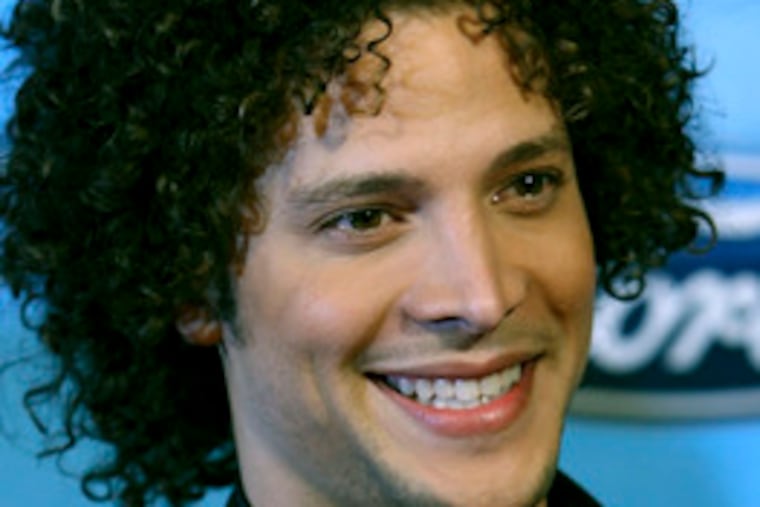Jonathan Storm | All this 'Idol' flash leaves contestants in shadows
Has American Idol gotten too glitzy for its own good? Hauling in old-time superstars like Diana Ross and Tony Bennett each week, juggling formats with an all-star telethon and a surprise, but exploitive, elimination reprieve; padding the schedule with extended broadcasts and packing the audience with celebs and overwrought tearful fans, the show isn't the amateur hour we fell in love with.

Has
American Idol
gotten too glitzy for its own good?
Hauling in old-time superstars like Diana Ross and Tony Bennett each week, juggling formats with an all-star telethon and a surprise, but exploitive, elimination reprieve; padding the schedule with extended broadcasts and packing the audience with celebs and overwrought tearful fans, the show isn't the amateur hour we fell in love with.
"When I did it, they had two modes: play and stop," said Doylestown's Justin Guarini, the original Idol runner-up in 2002, in a telephone interview. "Now they have a huge orchestra, and a beautiful stage. They get to show a lot of what the contestants can do. I think it's great."
Grateful Guarini, who still has ties to the Idol machine with a commentary show on the TV Guide Network, is in the minority. There's malaise in the audience. Things aren't quite right.
"With the star power, it's just not as much of a contest," said Chuck Haas, an Idol addict from Havertown. "The show got a little flashy this year, and it was overkill. It didn't stay focused on the contestants and their individual talents. It lost the appeal of the girl or boy next door."
"Fox has been outfoxed," said Janet Poore, a marketing executive from Plymouth Meeting, who checks in with TV's most popular show to stay abreast of the consumer culture, and who cited a different deficiency in Season 6.
"They turned it into such a freak show at the beginning. The auditions set the tone for the whole year. They were a lot meaner, and that, in turn, gave life to outside efforts by people like Howard Stern to basically destroy the show."
The ratings, which were down 10 to 15 percent during the hair-raising reign of Sanjaya Malakar ("He never should have been a finalist," Poore said), bounced back with last week's results show, when two of the last three remaining men in this year's ragged crop got the hook.
"We're headed for a big finish," said media maven Stacey Schulman, chief executive officer of Hi: Human Interaction, a consulting firm. "There are four good ones left, and we're still going to have our 'Ohmigod, how-can-we-ever-choose?' moment, but the show this year has been somewhat contrary to its essence as America's contest."
Schulman has studied Idol extensively and determined that fans developed special ties to its three main sponsors, Coca-Cola, Ford and AT&T. But she thinks it may have lost its corporate and artistic identity with the big April 25 two-hour telethon, staged from different venues and featuring entertainers from Miss Piggy to Elvis. Through the wonders of modern technology, the King came to us from beyond the grave to sing a duet with Celine Dion.
It's hard to say if a living Elvis would have even crossed the street for that gig.
"Reaching out to the stars and major corporate donors, the commerciality just seems much more obvious," Schulman said. "It's almost as if it's an amateur contest in a professional world."
Poore said the telethon was a marketing success. It raised almost $70 million, according to President Bush, who, with his wife, Laura, gave a videotaped thank you to fans last week. Even the putative leader of the free world has hitched his horse to the Idol bandwagon.
"Raising so much to help children in Africa and here helps to redeem the show's image," Poore said, "because it had seemed so shallow this season, taking advantage of people in auditions."
But then she got to the core of what's bothering many Idol fans. "As a TV show, it didn't thrill me."
Poore and Schulman may watch primarily for professional reasons, but Havertown's Haas says he's an unabashed fan. "I may be a little older than the average music buff [he's in his 60s], but I've only missed one episode," he said.
Like the others interviewed for this article, he's satisfied with the final four - Melinda Doolittle, LaKisha Jones, Blake Lewis and Jordin Sparks - though Guarini and Schulman both admitted a partiality for bald-headed Phil Stacey, who got the ax last week. "He had a wonderful, warm voice," Guarini said.
The Idol runner-up stood alone in his overall judgment of this year's talent: "The men weren't weak," he said, disagreeing with everyone with functioning ears. "Instead, the women were very strong."
Haas scoffed. "We've had second-, third- or fourth-place finishers who were better than anybody in the last 12 this year."
Marketers and fans alike agreed that it was much too soon to start bowing down to a new TV idol, not a hard call when Idol, twice a week, still gets 30 or 40 percent more viewers than anything else in prime time.
"I don't think the show is a lost cause," Haas said. "They can easily get it back. I'll tune in to see what's there next year."
"A.I. is nowhere near the end," Schulman said, "though this is probably the first season where we're really contemplating that question. The ratings are a little different. The stunting and the all-star appearances, packing the audiences with Hollywood types, these are signs that they're trying artificially to pump up the volume.
"It may be that we should start looking at artists and bands launching themselves on MySpace, coming up through the underground - the People's Choice in non-corporate-assisted methods."